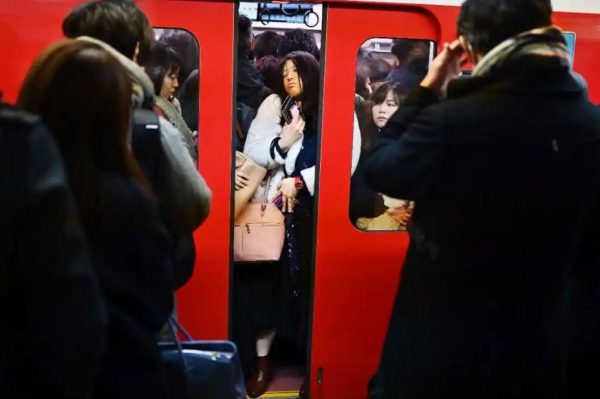Unraveling the groping epidemic on Japanese trains
January 12, 2024 · By Cristian Martini Grimaldi for www.ucanews.com

Morning rush hour time on the Tokyo metro train on Jan. 28, 2020. (Photo: AFP)
Unraveling the groping epidemic on Japanese trains
While Japan is often celebrated as a nation of safety and low crime rates, this perception may not resonate with everyone, especially young female students in middle and high school. Their experiences and perspectives might paint a different picture of safety in public spaces.
In recent times, Japan has been witnessing a deeply troubling online trend with a noticeable increase in posts that encourage groping and molestation of students on trains, particularly during the high-pressure entrance examination season which is about to start next week.
The situation is particularly alarming because these students, already under immense stress due to their upcoming exams, are being specifically targeted.
The perpetrators exploit the students’ fear of being late for their exams, a situation that might deter the young victims from reporting these heinous acts. This calculated targeting of students, at a time when they are most vulnerable, reflects a sinister aspect of societal abuse and highlights the need for effective solutions.
Addressing why groping, particularly in public spaces like trains, is a problem in Japan requires an understanding of certain aspects of Japanese society and culture that might contribute to the specific manifestation of the problem. Let’s start with the most obvious.
The issue of overcrowded public transportation in Japan, particularly in major cities like Tokyo, is a significant factor that unfortunately creates opportunities for inappropriate behavior such as groping.
“The legal consequences for individuals convicted of groping, known as ‘chikan,’ are quite light”
During rush hours, the trains are often packed to capacity, with passengers standing close to one another. This congestion can make it difficult to move or even identify who might be responsible for any inappropriate contact. In such crowded conditions, it becomes easier for perpetrators to remain anonymous.
But there is also an element of culture. Japan is known for its indirect communication style and non-confrontational social norms; this plays a significant role in how victims of groping respond to these incidents by possibly creating a barrier for victims seeking to speak out or confront their assailants.
Another factor is that in Japan, the legal consequences for individuals convicted of groping, known as “chikan,” are quite light, especially for a first-time offender. It might include a simple compensation to the victim and a warning.
But even when we consider cases of repeat offenders of groping, the sentences — which can vary depending on the circumstances of each case — are generally fines and in the most severe cases prison terms of up to two years.
When evaluating the sentencing disparities between repeat offenders of groping and individuals who commit violent acts like stabbings in public places, we are stunned by the giant gap.
A two-year prison sentence for repeat gropers, when contrasted with sentences exceeding 20 years for non-fatal stabbing incidents in subways, raises questions about the relative harm these crimes inflict on society.
“The psychological trauma and long-term effects on victims, who are often repeatedly targeted, are significant”
We need to recognize that although an individual wielding a knife poses an immediate and visible threat, often directed towards other adults who might have some capacity to defend themselves, the impact of sexual crimes like groping is often huge.
The psychological trauma and long-term effects on victims, who are often repeatedly targeted, are significant. This is especially concerning in cases where the offenders are serial perpetrators, as highlighted by recent incidents where individuals have confessed to committing such acts hundreds of times.
Lastly, another factor that is specific to Japan is the portrayal of young women and schoolgirls in Japanese media, which often idealizes and romanticizes youth, creating a problematic overlap between fantasy and reality.
This sexualization in media contributes to a societal atmosphere where inappropriate behavior toward young women is not only normalized but often trivialized.
If there were a genuine commitment to fostering positive societal change, the issue of sexualizing underage girls in the media could be addressed immediately by enacting legislation that prohibits the depiction of underage girls in revealing attire across various media platforms, including television, manga, and magazines.
Such a law would not only serve as a direct response to the issue but also signify a broader commitment to respecting and protecting the dignity of young women. It could act as a catalyst for cultural change, challenging existing norms and encouraging more responsible and respectful representations in the media.
*The views expressed in this article are those of the author and do not necessarily reflect the official editorial position of UCA News.






